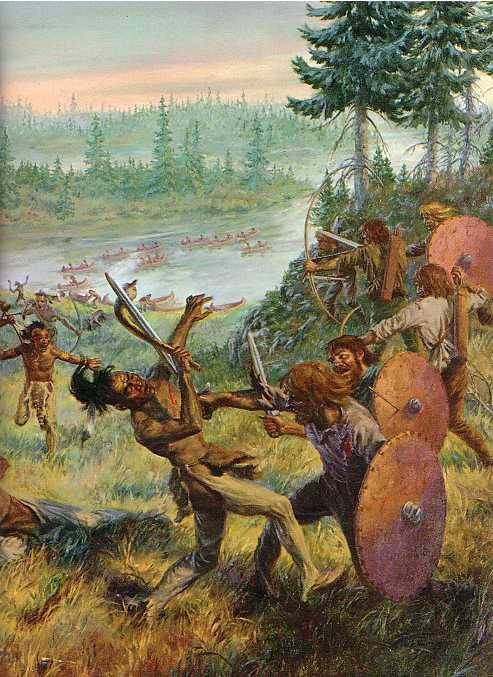I was doing some research and I love to think about these things. It has probably been discussed before, but still I wonder. Now I assume Vinland was located on Newfoundland and / or Labrador. From the Vinland saga it seems Vinland wasn't a colony but they did trade a bit and got wood there which was rare on Greenland. I think that to even consider a colony on Vinland you should assume the colonies on Greenland would also prosper more. Main export product was ivory and in lesser extends furs, so let's assume demand for those resources would be higher. Also a lot of the people in norway emigrated because they were exiled or overpopulation. Let's assume one group of people decides to head into the west instead of somewhere else in Europe, either they don't get invited or they just heard of Vinland and I dunno they hoped it might be a better place then were they went in real history. A bishop in Bremen did write down that the king of Denmark knew about Vinland, so it can be assumed that some nobles also heard of it and at least in that timeframe some stories of this new land were known.
So I can see a standing colony from Vinland happen when
1. Greenland succeeds a bit more or at least sees some increase in the demand of wood so more vessels are send to Vinland to get resources eventually becoming a colony.
2. An exiled guy, pretty much the same way as with Greenland, decides to head west and set up camp there. Either way I think Greenland and trade with Europe is a must.
Now let's assume camp is set up and they are either friendly or at least not hostile with the natives and can fend them off. Vinland would mostly be able to trade wood with Greenland and maybe furs to Iceland and from there further into europe. In this timeframe aggriculture should be possible as it was even practiced on greenland. Now I don't believe enough people would emigrate to Vinland to really start a norse colony, but I do believe that they might be able to overcome the natives or interact with them, very much as most of the vikings did in europe, like normandy. They would still have better weapons and things. Eventually though the little ice age would make the Greenland colony go downwards just as it did in real history. Maybe when Vinland would actually be there it would become a place were refugees would go.
Now it's assumed arround 3.000 people lived in Greenland in real history, in my case greenland would prosper a bit more, but let's be real over 10.000 people wouldn't be living in greenland, I'm guessing that at that time maybe a few hundered or a thousand max might be living in Vinland and then I'm considering how economically viable that would be if all they traded was wood, fur and ivory. Also the fact that wood might be scarce, but assuming Vinland could actually get better farming and cattle going they might be even going to export food to support Greenland. Now assuming things get going a bit better in Vinland and with the little ice age Greenlanders actually migrate there, since that's now an option. Ties are still cut with Iceland pretty much and we have a colony of maybe 3.000 to 5.000 or so Vinlanders. They wouldn't conquer an empire in North America soon and I think it's foolish to assume mass migration would find place.
However what would be the implications of a small yet prospering colony on Newfoundland. First off all I think they would interact with the locals, maybe some wars, but let's assume Norse influence gets established firmly on Newfoundland. Also there's the question wether christianity would be introduced into Vinland, since Greenland did get a monastery I would assume that if Greenland would prosper more and from there Vinland would be a viable option to colonize, christianity might have reached it. Allthough it's interesting since I don't think Vinland would be in a position were it would be appointed a monk from Europe... So christianity might be mixed more with the pagan religion from the other Norse settlers and maybe the local population. Also it might be more introduced via the people that eventually would come from Greenland when the little ice age conditions force these people to flee. This would maybe lead to a christian inspired religion.
Now assuming they find some of the metals found on Newfoundland and assimilate the locals into their communities Vinland might actually become a really weird state, with it's own religion but also a state based on medieval Europe. With a norse elite and weapons inspired on medieval Europe. I dunno if they would eventually still have 'knights' I guess not, but if they started trade or war with other natives further south Vinland might become of a bigger influence. Now I don't think that when europe eventually arrived it would have been different going with guns against swords instead of guns against spears, but there are some factors to take into account.
If Vinland prospers it'll in the end mostly be natives adopting the religion and stateform of the norse and interacting with them, eventually I don't think it will stay a norse elite only and as such I don't think explorers later on would really run into europeans. However in the 18th century Denmark reclaimed Greenland and maybe with some supplies from Vinland there might actually still be small communities there, mostly under influence of Vinland after contact with Iceland was broken, so when this connection is re-established that would be interesting. Honestly I could imagine Denmark just claiming that they still own Greenland and after discovering Vinland they might extend that claim to there. Vinland would now be independent for several 100 of years, about 400 years since the start of the little ice age and I could hardly imagine them caring about the claim. I don't see Denmark actually invade north America at that point, but they might start resetteling Greenland. Other option is that Vinland actually still remembers were they came from and sailing back to iceland themself to re-establish contact. It wouldn't be unthinkable they have saga's telling about their coming to the new world and they probably would have more reason to remember Europe then Europe would have remembering them.
Would it change much in the end. I think it might not matter much for the rest of the new world, allthough if Europeans really did colonize diseases might have spread in the America's earlier and at a much slower rate, giving the locals time to adapt and have some immunity by the time European explorers arrived. Still I think that Vinland would have been a colony before the black death and maybe some other medieval diseases from Europe, so there might still be something to kill off a lot of the locals. Maybe also a bit of technology exchange, but I doubt it would reach southern or middle America. Allthough if Vinland would have kept exploring they would have had a 400 or 500 year timeframe to really trade and who knows what they would have done when they knew about the riches in the maya cities. But do keep in mind that in this timeframe the aztecs were also starting to prosper, now what would have happened if they would have also gotten into contact with Vinland and not only got acces to their technology, but maybe more important got influenced by their political structures from medieval europe.
In the end I think the conquest of the new world would have been harder, less dissease and maybe more organized natives with a little better weapons. They would still lose in the end I think, but maybe profits would be less and thus less effort would be put into going to the west and more in going to the east. I guess when the natives were given more time to adapt to the Europeans some states might have actually survived. Vinland itself might have survived or might have been taken, that itself isn't even the biggest impact, it would probably be taken but still have an identy, making that when the colonies would become independent from their respective European countries, Vinland would become so as Vinland and not Canada. All in all I think it might eventually lead to some native countries still existing to this day in America, probably modernized by European influences, but never taken. Also Vinland would take up eastern Canada most likely. I guess maybe the colonisation of Africa might have been earlier or more foccused upon when things would go more rough in the new world.
In the end options fan out way to far at this point, since you need to assume what influenced what... I enjoyed thinking about this subject though and I thought share it and maybe hear some interesting views from other people on this subject.





 Reply With Quote
Reply With Quote







































